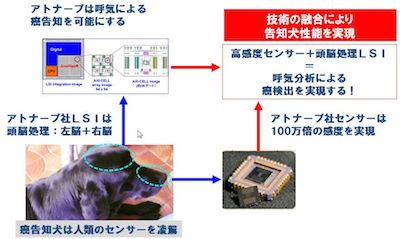 Tokyo-based Atonarp raised $8 million in a round led by Walden Riverwood Ventures to further develop the company's smart spectrometer. Atonarp is developing a spectrometer that can non-invasively detect early phase cancer detection and it also has designed on non-invasive blood glucose measurement.
Tokyo-based Atonarp raised $8 million in a round led by Walden Riverwood Ventures to further develop the company's smart spectrometer. Atonarp is developing a spectrometer that can non-invasively detect early phase cancer detection and it also has designed on non-invasive blood glucose measurement.
To detect cancer, the company's device analyzes a user's breath. Atonarp's website notes that several different organizations have conducted research, including Cleveland Clinic, on how to detect cancer through a user's breath. The company noticed that while some of these studies got as high as 93 percent accuracy for detecting devices, a dog that was trained to detect cancer had 98 percent accuracy.
What dogs had that sensor technology didn't was the use of their full brains. After coming to this conclusion, Atonarp said it connected its sensors to a platform that uses algorithms inspired by dog brains to diagnose diseases with higher accuracy.
The company is testing its product with manufacturers this year and plans to start production of the platform by early next year. Atonarp aims to also use their technology in the oil and gas industry.
Another company, Vantage Health, announced in February that they partnered with Scripps Translational Science Institute (STSI) to help develop its point-of-care chemical sensor apps. As part of the partnership, STSI would help validate the sensors, which are able to detect certain basic volatile organic compounds (VOCs), by using gas chromatography and mass spectrometry.
The group aims to use the Vantage Health Sensor, as the company calls it, to detect VOCs commonly associated with lung cancer. The company also signed a five-year exclusive deal with NASA to commercialize its patented chemical sensors as mobile health products.
Atonarp states that it is also applying its smart spectrometer technology to noninvasive blood glucose measurement.
A few consumer-facing devices that popped up in recent years claimed to offer passive nutrition tracking through spectrometer technology.
One device, Airo informed its early backers by way of email that it has refunded their money and will not put the device back up for sale until it has been tested and validated further. This happened three weeks after the device maker began taking preorders.
Another two companies have developed products that they claim will analyze the nutritional content of food through spectrometer technology. The first device, called SCiO, raised $2.2 million on Kickstarter, on top of $4 million to $5 million in funding from venture capitalists including Khosla Ventures in June. The other, called TellSpec, crowdfunded its device in October 2013 and raised $386,000. The product has not yet launched.




















